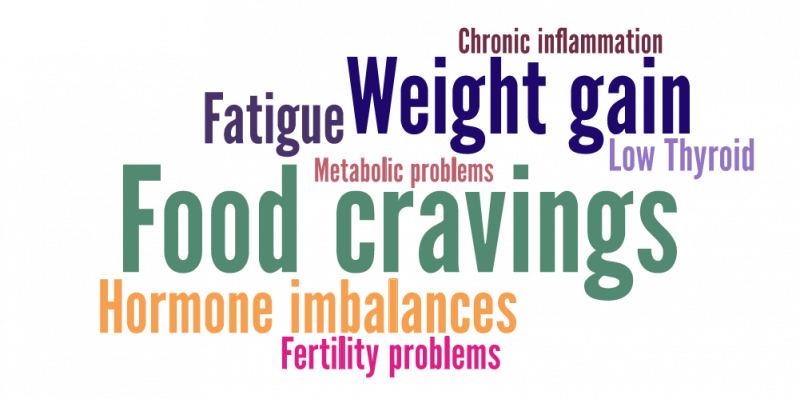
Note: If you read this post on balancing hormones naturally and felt confused about the role of leptin in hunger and metabolism, this post is for you!
Ahhh, 1994 – the year that gave us The Lion King, Sony PlayStation, and Leptin. Okay, you probably don’t remember that last one, but it was (and is) a huge deal.
You see, scientists used to believe that our fat cells do nothing but store energy and keep us warm, but it turns out they do something else that’s pretty amazing: Make leptin, the hormone that regulates body weight.
Leptin was first discovered when researchers isolated a gene which caused extreme obesity in mice – the mice weighed three times as much as a normal mouse and their appetites were described as “insatiable.” Although the mice had been around since the 1950’s, it wasn’t until 1994 that researcher Jeffrey Friedman was able to connect their genetic mutation with a diminished production of leptin. When researchers administered leptin to the mice, the mice lost weight. (source 1, source 2).
One quick note: Please keep in mind that this article is for informational purposes only and is based on the opinions of the authors. It is not intended to be a substitute for professional medical advice, diagnosis, or treatment – a full disclaimer can be found here. Okay, let’s jump in!

So, what is leptin exactly?
Leptin is from the Greek word leptos, which means thin. As we touched on earlier, it’s a hormone that is made by our fat cells – the more fat cells we have, the more leptin we produce. When it’s working properly, leptin is like a gauge that tells our bodies how much energy (fat) we have stored. The more fat we have, the more leptin is released to calm our hunger.
Leptin is also often called the CEO of hormones because it communicates with the hypothalamus – the part of the brain that controls levels of sex hormones, thyroid hormones, and stress hormones.
In times of food scarcity our body fat and leptin levels decrease, which increases our hunger drive, slows down our metabolism to save energy, and shuts off the reproductive system. Women need lots of energy to nurture a growing baby, so our hormonal systems keep a close eye on whether or not we have enough leptin (an indicator of stored energy levels) when managing our fertility.
For this reason, leptin controls when a teenage girl blossoms – girls with less body fat and lower leptin tend to enter puberty later than those with more body fat and higher leptin.
Going back to the impact of leptin on our metabolism, here’s the main takeaway: If we have a lot of fat our appetite should diminish, and if we don’t have enough our appetite should increase.
The operative word here is should.
What is Leptin Resistance?
As discussed in balancing hormones naturally, hormones are like keys that fit into very specific locks found on cells in the body. If the locks are broken, it doesn’t matter whether you have 1 key or 1,000,000 – the hormone can’t get into the cell. When the locks on the surface of cells are unable to receive the leptin, you may have symptoms of low leptin (such as hunger) even when serum levels are high (meaning that you have adequate fat stores). (source)
In other words, your body continues to feel hungry even after all your energy needs are met – this is called leptin resistance.

Leptin Resistance Symptoms
If you have leptin resistance, you may have symptoms of low leptin despite actually having high leptin. These include:
- Strong appetite cravings
- Weight gain
- Hormone imbalances
- Infertility
- Fatigue and low thyroid hormones
- Other metabolic issues
- Chronic inflammation
What’s the problem with high leptin levels?
In addition to controlling our satiety and influencing hormones, leptin is also an inflammatory molecule. High levels of leptin can create chronic inflammation and contribute to conditions such as autoimmunity and histamine intolerance (source 1, source 2).
High leptin and leptin resistance can also predispose people to other inflammatory diseases such as high cholesterol, heart disease, hypertension and diabetes (source). Neurosurgeon Dr. Jack Kruse believes that high leptin is the underlying issue that causes most modern chronic diseases, and that re-balancing leptin is the key to health (source).
Causes of Leptin Resistance
There are several factors that can contribute to leptin resistance. Here are some of the most common ones:
Circadian rhythm dysregulation
As we’ve covered before, bright blue/green light early in the morning stimulates the release of a hormone that helps us with focus and alertness, but that same light can make it hard to fall asleep if we’re exposed to it at night. (That’s why I wear these blue blocking glasses after sundown.)
In the same way, our bodies respond to feast/fast cycles that are tied into our circadian rhythm. (source) The ebb and flow of two hormones, leptin and insulin, alternates our bodies between fat burning and fat storing modes.
In the daytime we are in energy burning mode, which makes sense because it’s when we’re most active. At nighttime, our bodies go into “cleanup mode” – also known as autophagy. Historically, our schedules naturally aligned with these rhythms – eat for fuel in the day and rest in the evenings. These days, though, we often stay up late and snack late into the evening, which can throw off the ebb/flow rhythm of this rhythm.
“Eating within three hours of bedtime – late-night snacking – sends blood and heat to your core, which is a signal to the body to stay awake,” writes Dr. Michael Breus, who is a Diplomate of the American Board of Sleep Medicine, Fellow of The American Academy of Sleep Medicine, and the author of The Power of When.
In addition to signaling our bodies to stay awake, eating late at night alters the way our bodies respond to leptin. One of the best ways to increase leptin sensitivity is to restore the natural feast/fast cycle by fasting 10-12 hours between the last meal of one day and the first meal of the next morning.
(Note from Heather: I fast from 8pm to 8am most days. It was difficult at first because I was a late-night snacker, but after a while I found that I no longer had cravings before bed. Intermittent fasting helped me improve my leptin sensitivity, which had become an issue after my third baby was born.)
Lack of deep, restorative sleep
Although related to the section on circadian rhythm above, there are times when poor sleep is not associated with circadian rhythm dysregulation. If you are sleeping enough but don’t wake feeling rested, it might be worth asking your doctor for a referral to a sleep medicine specialist to screen for issues that may prevent you from getting restful sleep. For example, sleep apnea and airway problems that restrict breathing at night (hypopnea) may cause leptin resistance, metabolic syndrome, depression, and many other health problems (source, source 2).
You might have noticed before that you get much hungrier after a night of poor sleep. That’s because lack of sleep both reduces the amount of leptin in your body and makes you leptin resistant. (source) For more information on getting deeper, more restful sleep, check out 18 Science-Backed Sleep Tips.
Inflammation
Inflammation of the hypothalamus can cause leptin resistance, which is why some people find it difficult to lose weight when consuming inflammatory foods (foods they are sensitive to) or struggling with a chronic infection. Toxic molds and other sources of inflammation in the environment can also cause leptin resistance. (source)
Inflammation and weight gain can be a vicious cycle. High body fat is inflammatory, which causes leptin resistance, which can cause more weight gain. While the fat needs to be burned off, sometimes the key to doing that is to reduce inflammation.
Aging
It does get harder to lose weight as we get older. One of the key genes that leptin turn on in the hypothalamus is the longevity gene called Sirtuin1 (source). If this anti-aging gene does not work well, it can cause leptin resistance. Fortunately, there are many ways that we can improve the function of the Sirtuin gene and slow down aging, which maintains leptin sensitivity.
Is There a Test for Leptin Resistance?
Yes. Blood tests for leptin are available through your physician. It is typically ordered along with other routine metabolic bloodwork such as cholesterol, triglycerides, and blood sugar.
However, some practitioners such as Dr. Kruse consider leptin resistance to be pretty simple to confirm based on symptoms and lifestyle. (source)
Is It Possible to Reverse Leptin Resistance?
Fortunately, leptin resistance is reversible through diet, lifestyle, and supplementation.
7 Ways to Reset Leptin
1. Maintain a healthy circadian rhythm by avoiding blue light at night (I use these blue-blocking glasses to improve my sleep) and getting bright light first thing in the morning (there are also light therapy glasses that can be worn indoors).
2. Ensure that you get enough quality sleep using these tips. If you are sleeping enough but not waking up rested, consider seeing a sleep medicine specialist to screen for issues that may prevent you from getting restful sleep.
3. Eat a healthy diet that contains adequate protein and is not excessive in carbs. Here are some ways to do that if you’re on a budget.
4. Work with the feast/fast component of your circadian rhythm – which activates the longevity Sirtuin 1 pathway – by fasting 12 hours a day. (That’s overnight, including sleep.) Exercising and supplementing with resveratrol have also been found to activate the Sirtuin 1 gene. (source 1, source 2) Perfect Supplements makes an excellent whole food-based resveratrol supplement.
5. Manage stress – Excessive stress causes hormone imbalances that can influence leptin sensitivity. If the suggestion to manage stress makes you feel MORE stressed because you have no idea how to do that, here are 8 ways to manage stress that I’ve found helpful.
6. Chill out – Cold exposure can help make you more leptin sensitive. (source) Some common ways to use this strategy are:
- Turning down the thermostat in the house
- Swimming in cold water
- Wear fewer layers of clothes
- Taking a cold shower or bath
- Cryotherapy
7. Manage inflammation
Inflammation is a key piece of the puzzle in fixing leptin resistance. To manage inflammation, consider:
- Identifying foods that you are sensitive to
- Healing the gut and re-balancing your gut bacteria
- Identifying sources of environmental allergies and address them accordingly
- Addressing autoimmunity
Want to dive deeper?
Here are some posts you may find helpful:
- What Are The Symptoms Of Hormone Imbalance?
- Holistic Guide To Hormone Testing
- How to Balance Hormones Naturally
About the authors: This article was coauthored by Heather Dessinger Dr. Natcha Maithai (PhD). Dr. Maithai is a Registered Holistic Nutritionist and Functional Diagnostic Nutrition Practitioner with a PhD in molecular genetics. After becoming frustrated with hormonal problems that went undiagnosed despite her best efforts, Dr. Maithai applied tools she learned as a cancer researcher to dive into available scientific literature and find a holistic solution. You can find her health insights, biohacking tips, and information about working with her on her website, Natcha Maithai.




